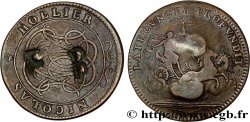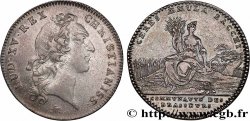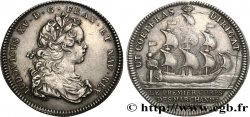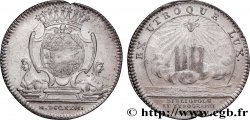fjt_959278 - CORPORATIONS CINQUIEME CORPS DES MARCHANDS LES BONNETIERS 1746
Not available.
Item sold on our e-shop (2024)
Price : 110.00 €
Item sold on our e-shop (2024)
Price : 110.00 €
Type : CINQUIEME CORPS DES MARCHANDS
LES BONNETIERS
Date: 1746
Metal : silver
Diameter : 28 mm
Orientation dies : 6 h.
Weight : 6,68 g.
Edge : cannelée
Rarity : R2
Catalogue references :
Obverse
Obverse legend : LUD. XV. REX. CHRISTIANISS.
Obverse description : Buste à droite de Louis XV signé fm.
Obverse translation : Louis XV, roi très chrétien.
Reverse
Reverse legend : QUANTOS. DUO. FLECTIT. IN. USUS ; À L'EXERGUE : LES. MDS. BONNETIERS. 1746.
Reverse description : Écu aux armes des Bonnetiers : cinq navires allant à gauche sous une étoile et au-dessous de la Toison d'or couronnée.
Reverse translation : Vers combien d'usages il les tourne tous les deux !.
Commentary
En 1390, on comprend sous le titre de bonnetiers, les aumussiers, les mitainiers et les chapeliers. Dans les premiers temps de la fabrication appelée plus tard bonneterie, on appelait bonnet le fil de laine tissé à la main avec l'aiguille et la broche. Les bonnetiers ont le droit de vendre toutes sortes de bonnets de drap, de laine, ronds ou carrés, des bas, gants, chaussons, camisoles, caleçons, au métier, au tricot ou à l'aiguille, en soie, laine, coton, chanvre ou lin, poil de chameau ou de castor et autres pareilles matières.
Les bonnetiers étaient chargés de tisser à la main le fil de laine avec une aiguille, la bonneterie, ou à l’aide d’une broche, pour le broché ou “jersey”. On les appelait aussi chapeliers, gantiers ou mitainiers mais avec le temps le terme bonnetier devient générique. Leurs statuts sont rédigés en 1550 et confirmés en 1608. En 1660, un arrêt décide qu’ils auront préséance sur les orfèvres et seront désormais au cinquième rang des marchands, ce que rappelle les cinq navires sur leur blason ou au revers de ce jeton. En 1776, unis aux chapeliers et pelletiers ils formeront le troisième des six corps. Au XVIIIe siècle il y a environ 450 maisons de bonneterie à Paris. La devise du revers est strictement liée à la corporation des bonnetiers (F. 4872-4880b).
Les bonnetiers étaient chargés de tisser à la main le fil de laine avec une aiguille, la bonneterie, ou à l’aide d’une broche, pour le broché ou “jersey”. On les appelait aussi chapeliers, gantiers ou mitainiers mais avec le temps le terme bonnetier devient générique. Leurs statuts sont rédigés en 1550 et confirmés en 1608. En 1660, un arrêt décide qu’ils auront préséance sur les orfèvres et seront désormais au cinquième rang des marchands, ce que rappelle les cinq navires sur leur blason ou au revers de ce jeton. En 1776, unis aux chapeliers et pelletiers ils formeront le troisième des six corps. Au XVIIIe siècle il y a environ 450 maisons de bonneterie à Paris. La devise du revers est strictement liée à la corporation des bonnetiers (F. 4872-4880b).







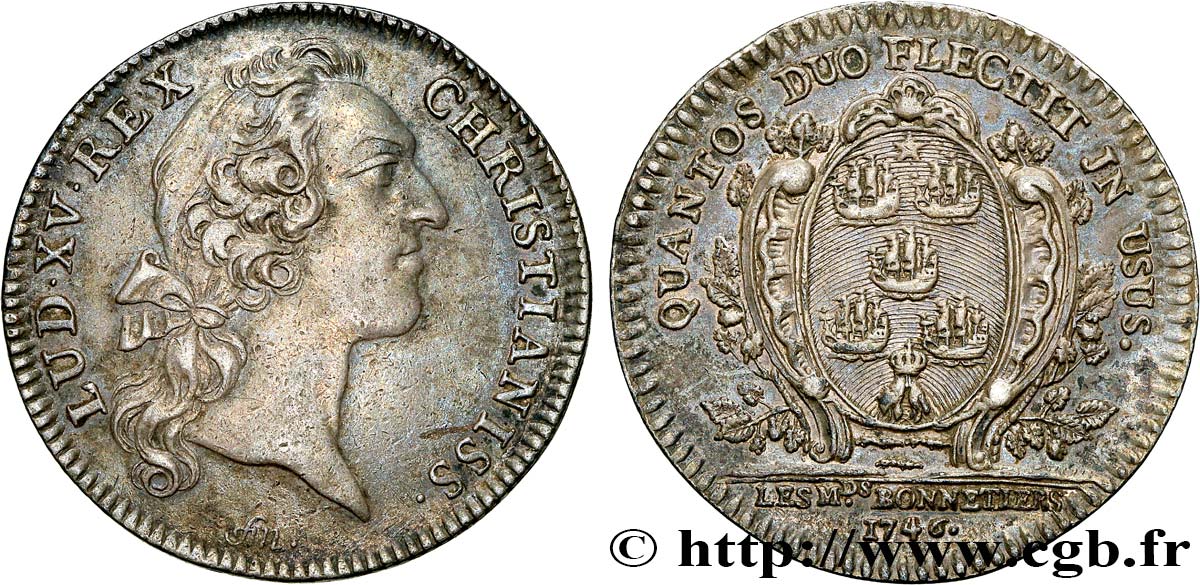
 Report a mistake
Report a mistake Print the page
Print the page Share my selection
Share my selection Ask a question
Ask a question Consign / sell
Consign / sell
 Full data
Full data